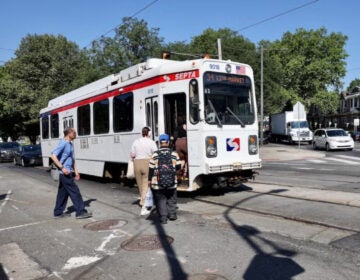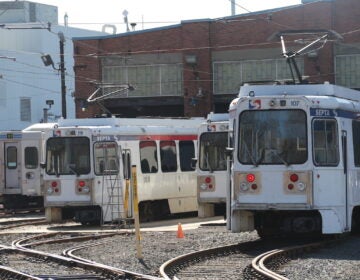Smart card working group pans one-way fare collection plan

A report put out by a smart card working group gives some clues as to how the new fare payment system may be implemented on SEPTA’s regional rail system.
The report, scheduled to be released at a press conference Wednesday afternoon and obtained by PlanPhilly, could be the death knell of the one-way fare collection proposal, which would have regional rail riders paying double for trips leaving Center City. Inbound trips would be free.
The working group is composed of stakeholders including county and city planners and transit advocates and was convened by SEPTA to analyze smart card implementation on regional rail in the wake of criticism of internal SEPTA plans. Meetings are being mediated by the Economy League of Greater Philadelphia.
The group voted 11-1 in favor of continuing with two-way fares under the new payment system. Riders would have to tag in and out at the beginning and end of each trip. That could be accomplished at turnstiles to be installed at the five Center City stations, validating machines to be installed at many outlying stations or by a conductor.
The report noted that a two-way fare collection system would reduce fare evasion and “better facilitates the needs of one-way travelers.” A two-way fare collection system would cost slightly more, however, because — similar to the Washington, D.C., Metro system — vending machines would have to be placed inside turnstiles at Center City regional rail stations to allow riders who have insufficient money on their fare cards to add value to them before leaving the paid areas.
While the decisions of the group are non-binding, members represent important political interests, and their consensus will carry weight as SEPTA settles important policy questions related to the implementation of the new fare system.
The working group also evaluated several proposals for restructuring regional rail fare zones. The number of zones could be reduced to three, with an additional Center City zone.
The group voted unanimously to default fare collection to zone 3, meaning riders who fail to tag out would be charged the highest rate. This has implications for what fare collection would look like on regional rail.
An addendum to SEPTA’s request for proposals to construct the system had assumed a default zone 2 system. Under that scenario, riders who fail to get tagged out of the system would be charged a zone 2 rate. In effect, riders traveling to zone 1 stations would have to tag out, riders traveling to zone 2 would be automatically checked out of the system, and zone 3 riders would be tagged off by SEPTA conductors.
Zone 3 default collection would involve the installation of validating machines on Zone 2 stations but would allow more uniform fare collection.
While the Zone 3 option would cost $1 million to $2 million more in capital costs and increased operating expenses of $1.4 million, according to SEPTA, it would also bring in increased revenue of $1.5 million annually because of decreased fare evasion.
The working group also agreed that adopting an honor system for fare collection — in which fares would be checked by random inspections — could lead to revenue losses and would require legislation from Harrisburg to allow uniform punishment of fare evasion across county and municipal lines.
And it rejected a proposal put forward by the Delaware Valley Association of Rail Passengers that would have installed ticket vending machines at every station similar to New Jersey Transit. The working group instead supported a proposal to limit vending machine installation to Center City stations.
SEPTA had argued that installing ticket vending machines in outlying stations would raise the project’s capital and operating costs significantly and put the machines at risk for vandalism.
Not all open questions have been resolved, however. The group agreed to continue discussions relating to zone restructuring and transfers.
SEPTA is hoping to award a contract to build the system by the end of the summer and has said that not all policy issues need to be resolved before that happens.
Contact the reporter at acampisi@planphilly.com
WHYY is your source for fact-based, in-depth journalism and information. As a nonprofit organization, we rely on financial support from readers like you. Please give today.






